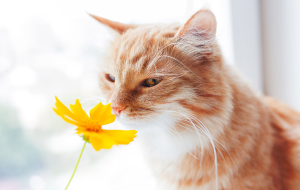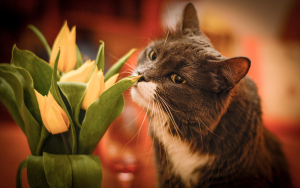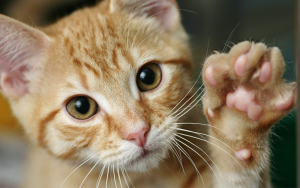Why Does My Cat Have Diarrhea? Causes, Symptoms, and Treatment Guide for Pet Owners

As a responsible cat owner, one of the most concerning issues you might face is when your cat experiences diarrhea. While it can be a temporary and mild condition, in some cases, diarrhea in cats may indicate a more serious underlying health issue. If
you’ve noticed your cat suffering from diarrhea, it’s crucial to understand the potential causes, symptoms, and treatment options to ensure your furry friend receives the best care.
In this article, we will explore the common causes of diarrhea in cats, its symptoms, and the steps you can take to treat and manage the condition. By understanding these factors, you can better help your cat recover and avoid future digestive problems.
Understanding Diarrhea in Cats
Diarrhea is characterized by frequent, loose, or watery stools. In cats, this condition can result from various factors, including dietary changes, infections, parasites, stress, or chronic illnesses. Diarrhea can sometimes resolve on its own, but if
it persists for more than 24-48 hours or is accompanied by other symptoms such as vomiting, lethargy, or a decrease in appetite, it is important to seek veterinary care promptly.
Common Causes of Diarrhea in Cats
1. Dietary Changes
One of the most common causes of diarrhea in cats is a sudden change in diet. Cats have sensitive digestive systems, and switching from one type of food to another (whether it’s a change in brand, flavor, or ingredients) can upset their stomachs. This
is particularly true if the new food is not nutritionally balanced or contains ingredients that are hard for your cat to digest.
2. Food Intolerances or Allergies
Some cats have food allergies or sensitivities that can trigger gastrointestinal distress, including diarrhea. Common allergens for cats include dairy, grains, and certain proteins like chicken or beef. If your cat consistently experiences diarrhea after
eating specific foods, it may be due to a food intolerance or allergy.
3. Parasites
Intestinal parasites, such as roundworms, hookworms, tapeworms, and giardia, are a frequent cause of diarrhea in cats. These parasites can be contracted from contaminated food, water, or environments, and they disrupt the digestive process, leading to
diarrhea. Kittens are particularly vulnerable to parasitic infections.
4. Infections
Bacterial, viral, or fungal infections can cause diarrhea in cats. Common infections that can lead to gastrointestinal upset include salmonella, E. coli, and Campylobacter. Viral infections, such as feline parvovirus or feline coronavirus, can also cause diarrhea, often accompanied by other symptoms such as vomiting and fever.
5. Stress and Anxiety
Just like humans, cats can experience digestive problems due to stress. Changes in their environment, such as moving to a new home, the arrival of a new pet, or loud noises, can trigger stress-induced diarrhea. Cats are creatures of habit, and disruptions
to their routine can affect their gastrointestinal health.
6. Chronic Diseases
Certain chronic health conditions, such as inflammatory bowel disease (IBD), hyperthyroidism, or pancreatitis, can cause long-term diarrhea in cats. These conditions often require ongoing management and
treatment from a veterinarian. If your cat’s diarrhea is persistent or recurring, it’s essential to consult with a vet for a proper diagnosis and treatment plan.
7. Toxins and Poisoning
Ingesting toxins or poisonous substances can lead to acute diarrhea in cats. Household chemicals, plants, medications, or spoiled food are common culprits. If you suspect that your cat has ingested something toxic, seek veterinary help immediately. Time
is critical in such cases to prevent serious complications.
8. Antibiotic-Related Diarrhea
If your cat has been prescribed antibiotics, the medication may disrupt the natural balance of bacteria in their gut, leading to diarrhea. This type of diarrhea is usually short-lived and resolves once the antibiotic course is finished. However, if it
persists, your veterinarian may recommend a probiotic supplement to restore the gut’s balance.
Symptoms to Watch for in Cats with Diarrhea
While diarrhea itself is a symptom, it’s important to be aware of other signs that could indicate a more serious health issue. Watch for the following:
- Vomiting: Frequent vomiting alongside diarrhea may indicate a viral or bacterial infection, or a more serious condition like pancreatitis or intestinal obstruction.
- Lethargy: If your cat is unusually tired, weak, or inactive, it could suggest a systemic infection or severe dehydration.
- Blood in Stool: Blood, either bright red or dark and tarry, in your cat’s stool can be a sign of intestinal bleeding, infection, or severe inflammation.
- Loss of Appetite: A lack of interest in food, combined with diarrhea, could signal an infection, parasites, or other gastrointestinal disorders.
- Fever: A fever may accompany infections or other systemic illnesses that cause diarrhea.
If you observe any of these symptoms alongside diarrhea, it’s essential to seek veterinary attention immediately.
How to Treat Diarrhea in Cats
1. Provide Hydration
One of the most important aspects of treating diarrhea in cats is ensuring they stay hydrated. Diarrhea can lead to dehydration, which can quickly become life-threatening, especially in kittens, elderly cats, or those with underlying health issues. Offer
fresh water regularly, and consider using an electrolyte solution designed for pets to help replenish lost fluids.
2. Temporarily Withhold Food
In some cases, withholding food for 12-24 hours can allow your cat’s digestive system to rest and recover. However, this is only appropriate for adult cats in otherwise good health. Kittens, elderly cats, or cats with chronic health issues should not
be deprived of food for extended periods.
3. Offer a Bland Diet
Once the fasting period is over, you can begin feeding your cat a bland diet to ease their digestive system back into normal function. A common bland diet consists of boiled chicken (skinless and boneless) and white rice. Gradually reintroduce your cat’s
regular food over a period of a few days.
4. Probiotics
Probiotics can be helpful in restoring the balance of healthy bacteria in your cat’s gut, especially after diarrhea caused by antibiotics or infections. Consult your vet for the best probiotic supplement for your cat.
5. Medications
In cases of infection, parasites, or inflammation, your vet may prescribe medications to address the underlying cause of diarrhea. Antibiotics, antiparasitic treatments, or anti-inflammatory drugs may be necessary, depending on the diagnosis.
6. Veterinary Care
If your cat’s diarrhea persists for more than 48 hours, worsens, or is accompanied by severe symptoms like vomiting, blood in the stool, or lethargy, it’s crucial to visit the vet. A veterinarian will perform diagnostic tests, such as stool analysis,
blood work, and imaging, to determine the exact cause of the diarrhea and recommend appropriate treatment.
Preventing Diarrhea in Cats
While some causes of diarrhea in cats are unavoidable, there are several preventive measures you can take to reduce the risk:
- Gradually Change Diet: When transitioning to a new food, do so gradually over a week to allow your cat’s digestive system to adjust.
- Regular Deworming: Ensure your cat is regularly dewormed to prevent parasitic infections.
- Provide a Stable Environment: Minimize stress and sudden changes in your cat’s environment to help avoid stress-induced diarrhea.
- Avoid Toxic Foods: Be cautious about what your cat can access, ensuring they don’t ingest toxic substances or spoiled food.
- Regular Vet Check-ups: Regular veterinary visits can help catch any underlying health issues early before they lead to diarrhea or other symptoms.
Conclusion
Diarrhea in cats is a common and often treatable condition. By understanding the potential causes, symptoms, and treatment options, you can take the necessary steps to help your cat recover. Always monitor your cat’s health and behavior, and seek veterinary
care if the diarrhea persists or is accompanied by concerning symptoms. With the right approach, your cat can quickly bounce back to health, ensuring they continue to lead a happy, active life.
Remember, a healthy cat is a happy cat, and taking care of their digestive health is an essential part of responsible pet ownership.







